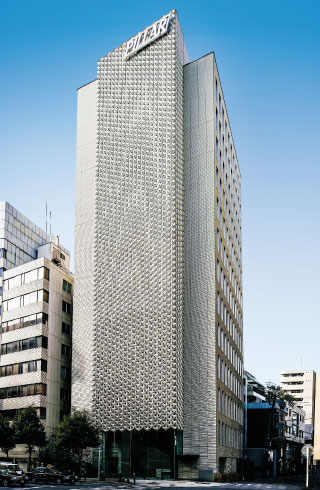Governance
Basic Approach
Customer satisfaction is the fundamental starting point of the Group’s corporate activities and earning the esteem and trust of customers makes it possible to achieve sustained growth and profits. The Group recognizes corporate governance as an important task of management for realizing its basic policy of connecting this to higher corporate value and the satisfaction of shareholders and other stakeholders. The Group believes it is important to establish management organizations and internal controls so that sound, transparent decision-making can be conducted quickly. Corporate governance fundamentally is not only compliance with laws and regulations but also consists of promoting business activities that respect corporate ethics, morality, and fairness and developing smooth, disciplined and cooperative relationships with all stakeholders.
Corporate Governance System


-
1 Advisory Committee
As advisory bodies to the Board of Directors, the Nomination Advisory Committee and the Remuneration Advisory Committee, which are voluntary committees, have been established to strengthen the supervisory function of the Board of Directors and enhance the corporate governance system by ensuring the transparency and objectivity of the assessment and decision-making process regarding the nomination and remuneration of directors. Each committee comprises at least three directors selected by the Board of Directors, and the majority of members are independent outside directors.
-
●Nomination Advisory Committee
The Nomination Advisory Committee deliberates on matters pertaining to the composition of the Board of Directors, appointment and dismissal of directors, and other matters, and reports to the Board of Directors. -
●Remuneration Advisory Committee
The Remuneration Advisory Committee deliberates on matters pertaining to the remuneration structure for directors, policies for determining their remuneration, contents of remuneration, and reports to the Board of Directors.
-
●Nomination Advisory Committee
-
2 Board of Directors
Four outside directors (two who are not members of the Audit & Supervisory Committee and two who are members of the Audit & Supervisory Committee) have been invited to sit on the Board of Directors, which meets regularly, and their opinions are sought based on their wide-ranging knowledge and experience in order to further raise the quality and transparency of management decisions and strengthen oversight. The schedule for board meetings is provided to outside directors in advance and their attendance is coordinated.
-
3 Audit & Supervisory Committee
PILLAR changed its legal format to a company with an Audit & Supervisory Committee upon approval by the Ordinary General Meeting of Shareholders on June 23, 2017. The Audit & Supervisory Committee comprises three directors who are Audit & Supervisory Committee members (including two outside directors) and is convened on a regular basis. Information and opinions are exchanged among the directors who are Audit & Supervisory Committee members and efforts are made to improve management oversight.
-
4 Internal Audit Office
In addition to audits by directors who are members of the Audit & Supervisory Committee, this Office has been established to conduct internal audits from the perspective of legality and propriety.
-
5 Security Trade Control Office
For control of products with export restrictions, we have established the Security Trade Control Office and are taking every possible measure in this area.
-
6 Committee
-
●ESG/SDGs Promotion Committee
In April 2021, the ESG/SDGs Promotion Committee was established as a higher-level organization to the CSR Committee and the Decarbonization and Global Environment Committee to oversee and promote activities related not only to corporate social responsibility but also to the environment, corporate governance, and the SDGs, thereby enhancing the effectiveness of our efforts to achieve sustainable development in harmony with society.
-
●Decarbonization and Global Environment Committee
We have established an environmental management system, headed by an executive officer in charge of the environment. We oversee the environmental management system and work to reduce regional and global negative impacts on the environment.
-
●Risk Management Committee
In the event of a crisis related to corporate business continuity, this Committee has been established for quick response and early containment, and has made efforts to respond in advance and after the fact by enacting Crisis Management Rules.
-
●Internal Control Assessment Committee
The Company has established the Internal Control Assessment Committee in response to the internal control system for financial reporting and conducts internal control assessments for the Group.
-
●Corporate Ethics Committee
The Corporate Ethics Committee has been established to ensure compliance with laws and regulations and to improve corporate ethics. We have established the Corporate Code of Ethics as a code of conduct for all employees, and have formulated the Group Code of Conduct as a specific set of standards.
-
●Disclosure Committee
The Disclosure Committee has been established to ensure timely and appropriate disclosure.
-
●Information Security Committee
The Information Security Committee is in place to improve information security.
-
●ESG/SDGs Promotion Committee
-
7 Technology Strategy Meeting
The Technology Strategy Meeting discusses strategic issues related to management and technology.
-
8 Management Meeting
The Management Meeting reports and reviews business execution and deliberates on important matters.
Disclosure
Regarding disclosure, PILLAR has established
the Disclosure Committee and conducts appropriate and timely
disclosure.
To administer our internal control system for financial reporting,
which was started in April 2008, we established the Internal Control
Assessment Committee and conduct assessments of internal
controls at the Group level. In April 2021, we established the ESG/
SDGs Promotion Committee as a superordinate organization to the CSR Committee to oversee and promote activities related not
only to corporate social responsibility but also to the environment,
corporate governance, and the SDGs, thereby enhancing the
effectiveness of our efforts to achieve sustainable development
in harmony with society. The Company publishes an annual
Integrated Report summarizing the content of these activities.
The status of these committees is reported regularly to the
representative director.
Risk Management
The Company has established a Risk Management Committee to oversee overall risk management, as well as Crisis Management Rules shared by the Company and its Group companies for the purpose of promptly responding to risks related to the business, and has built a risk management system based on these Rules. When unexpected situations arise, a response headquarters is established that is headed by a person appointed by the President, a system is launched to minimize damage and impact, and the situation is quickly addressed. In addition, in order to ensure the timely disclosure of risks and other important information, we established the Disclosure Committee and created a system for conducting timely, appropriate disclosure.
- Risks that should be managed
- ●Risks from changes in the semiconductor/LCD markets
- ●Risks related to quality
- ●Risks from overseas production/sales and foreign exchange trends
- ●Risks related to material procurement and price trends
- ●Risks related to technological development
- ●Risks related to litigation, etc.
- ●Risks related to factory operations
- ●Risks related to the COVID-19 pandemic
Compliance
In order to strengthen our compliance system, we have established the Corporate Code of Ethics as a code of conduct applicable to all Group companies. As a specific standard of conduct, we have established the Group Code of Conduct, which is presented on our intranet, and through our in-house training programs and the Corporate Ethics Committee, we strive to improve and thoroughly familiarize employees with compliance with laws and regulations and corporate ethics. In addition, we have established a Decarbonization and Global Environment Committee to develop products that take safety and environmental conservation into consideration, as well as an Environmental Policy. Based on this Environmental Policy, we are working to reduce environmental impact and to maintain and enhance our management system. Furthermore, in the event of a crisis related to corporate business continuity, the Company has established a Risk Management Committee and formulated Crisis Management Rules to ensure a quick response and early containment, and has made efforts to respond in advance and after the fact. Along with this, for control of products with export restrictions, we have established the Security Trade Control Office and are taking every possible measure in this area. We have introduced an internal reporting system for the early detection of misconduct, including violations of laws, regulations, and internal rules. In addition to a unified internal contact point for all Group employees and directors in Japan and overseas, an external contact point has been established for direct consultation with a legal advisor.
PILLAR subsidiaries are managed through a process that consists of approval and final approval based on the Affiliate Management Rules and reporting from the subsidiaries, but their autonomy as independent companies is also respected, and when there are important managerial matters that occur between Group companies, adequate discussions are conducted. In addition, the Internal Audit Office conducts internal audits of subsidiaries on a regular basis.
As a code of conduct that applies to all Group companies, the Group Code of Conduct as prepared by the Company is posted on our intranet to ensure that all employees are aware of the need to comply with laws, regulations, internal regulations, and social norms.
Tax Policy
The Group will appropriately fulfill its obligation to pay taxes on its business activities, thus contributing to society. We observe the tax laws of countries where we operate and international rules and pay taxes in a timely and appropriate manner in accordance with the laws and regulations.






